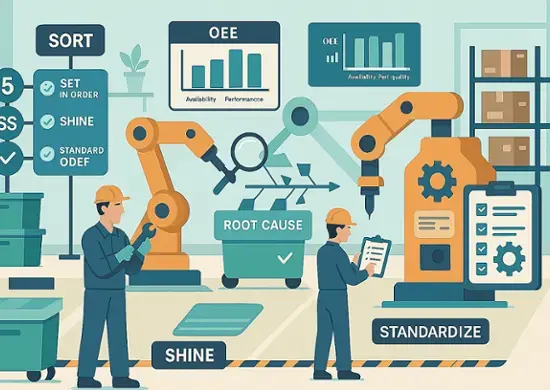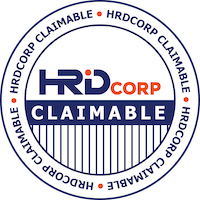Total Productive Maintenance
Master Total Productive Maintenance implementation and drive manufacturing excellence through our comprehensive training program. Excel in TPM principles, equipment effectiveness optimization, and maintenance strategies under expert guidance. Enroll in our specialized curriculum designed for manufacturing professionals seeking to eliminate losses, reduce defects, and build sustainable improvement culture.
- Available in:
- Malaysia

Corporate Pricing
Pax:
Training Provider Pricing
Pax:
Features
Subsidies

What you'll learn
- Implement autonomous maintenance using the seven-step model systematically
- Develop TPM implementation roadmaps with phased approaches and milestones
- Build sustainable TPM culture through leadership and cross-functional teams
- Design comprehensive planned and predictive maintenance programs successfully
- Calculate and interpret Overall Equipment Effectiveness metrics for improvement
- Apply TPM principles and eight pillars to manufacturing environments effectively
- Conduct root cause analysis using Why-Why, fishbone, and 4M techniques
Why should you attend?
This comprehensive training program provides participants with a thorough understanding of Total Productive Maintenance (TPM) principles and their practical application in manufacturing environments. The course begins with foundational concepts, exploring the evolution and global adoption of TPM, its synergy with lean manufacturing, and strategic objectives of achieving zero losses and zero defects. Participants will master the eight pillars of TPM, with detailed focus on focused improvement, autonomous maintenance, planned maintenance, and quality maintenance. The program emphasizes organizational structure and leadership requirements for successful TPM implementation, including cross-functional team formation and the establishment of TPM promotion offices. Practical skills development includes workplace organization through 5S methodology, Overall Equipment Effectiveness (OEE) calculation and interpretation, and comprehensive maintenance strategies. Participants will learn to identify and analyze equipment losses, apply root cause analysis techniques, and implement the seven-step autonomous maintenance model. Advanced topics cover predictive maintenance techniques, quality maintenance for zero defects, and early equipment management. The course integrates hands-on workshops, case studies, and group activities to reinforce learning. Participants will develop action planning and roadmapping skills, learn to build sustainable TPM culture, and understand the application of TPM principles to office environments. The program concludes with comprehensive audit and review processes, ensuring participants can sustain TPM gains and drive continuous improvement initiatives.
Course Syllabus
Day 1 - TPM Foundations & Principles
Short Break
15 minsShort Break
15 minsRecap and Q&A
15 minsLunch
1 hourShort Break
15 minsShort Break
15 minsShort Break
15 minsRecap and Q&A
15 minsEnd of Day 1
Day 2 - Equipment Performance & Maintenance
Short Break
15 minsShort Break
15 minsRecap and Q&A
15 minsLunch
1 hourShort Break
15 minsShort Break
15 minsShort Break
15 minsRecap and Q&A
15 minsEnd of Day 2
Day 3 - Implementation & Culture Development
Short Break
15 minsShort Break
15 minsRecap and Q&A
15 minsLunch
1 hourShort Break
15 minsShort Break
15 minsShort Break
15 minsRecap and Q&A
15 minsEnd of Day 3
Ratings and Reviews
Instructor
Habil Hadi Mohammed is a highly skilled Mechanical Engineer with a robust academic and professional background, currently pursuing a PhD in Biomedical Engineering at Universiti Putra Malaysia (UPM). His research focuses on 'Additive Manufacturing,' supported by UPM funding. Prior to his doctoral studies, he completed a Master's degree in Manufacturing Systems Engineering from the same university, where he excelled with a CGPA of 3.81/4. His dissertation explored the innovative use of single-mode fibre lasers for surface polishing of FDM printed parts. Habil's academic journey began with a Bachelor's degree in Mechanical Engineering from Salahaddin University-Hawler, Erbil, where he developed an internal ballistics model for artillery gun projectiles. In addition to his academic pursuits, Habil has accumulated significant industry experience. As of January 2024, he serves as a Developer Engineer for an international company based in Switzerland. In this role, he designs and develops machines using both 3D printing and conventional manufacturing techniques such as milling and turning. He successfully built and tested prototypes using self-built 3D printers and collaborates with Micro Precision Manufacturing (MPM) to support full-scale production processes. Since 2021, Habil has also been contributing as a Research Fellow at UPM's Faculty of Engineering. His work includes software development for multi-material Functionally Graded Material (FGM) 3D printers and designing automated sports equipment in collaboration with the Department of Sport Studies. He is actively involved in developing hydroponic plant systems and object-specific 3D printers for industry partners. Before his current roles, Habil gained managerial experience as an Area Manager at COZMO Market in Sulaymaniyah from 2016 to 2018, where he oversaw multiple departments and significantly increased sales through strategic planning. He also worked as a Sales Representative for BIODERMA during this period, achieving notable sales success. Habil's technical skills are complemented by various certifications in data management, visualization, programming languages like Python and C/C++, and design tools such as AutoCAD and Fusion360. His participation in numerous webinars and conferences highlights his commitment to continuous learning and staying abreast of emerging technologies. Fluent in Kurdish, Arabic, and English, Habil is well-equipped to engage with diverse teams across global platforms.
Minimum Qualification
Target Audience
Methodologies
FAQs
- Public pricing: applies for individuals signing up from different companies.
- Corporate pricing: applies if a company wants to have an intake for its employees only.
- Training provider pricing: applies only for other training providers looking to hire our trainers and use our content. Our content has a licensing fee.
Courses you may like
Why should you attend?
This comprehensive training program provides participants with a thorough understanding of Total Productive Maintenance (TPM) principles and their practical application in manufacturing environments. The course begins with foundational concepts, exploring the evolution and global adoption of TPM, its synergy with lean manufacturing, and strategic objectives of achieving zero losses and zero defects. Participants will master the eight pillars of TPM, with detailed focus on focused improvement, autonomous maintenance, planned maintenance, and quality maintenance. The program emphasizes organizational structure and leadership requirements for successful TPM implementation, including cross-functional team formation and the establishment of TPM promotion offices. Practical skills development includes workplace organization through 5S methodology, Overall Equipment Effectiveness (OEE) calculation and interpretation, and comprehensive maintenance strategies. Participants will learn to identify and analyze equipment losses, apply root cause analysis techniques, and implement the seven-step autonomous maintenance model. Advanced topics cover predictive maintenance techniques, quality maintenance for zero defects, and early equipment management. The course integrates hands-on workshops, case studies, and group activities to reinforce learning. Participants will develop action planning and roadmapping skills, learn to build sustainable TPM culture, and understand the application of TPM principles to office environments. The program concludes with comprehensive audit and review processes, ensuring participants can sustain TPM gains and drive continuous improvement initiatives.
What you'll learn
- Implement autonomous maintenance using the seven-step model systematically
- Develop TPM implementation roadmaps with phased approaches and milestones
- Build sustainable TPM culture through leadership and cross-functional teams
- Design comprehensive planned and predictive maintenance programs successfully
- Calculate and interpret Overall Equipment Effectiveness metrics for improvement
- Apply TPM principles and eight pillars to manufacturing environments effectively
- Conduct root cause analysis using Why-Why, fishbone, and 4M techniques
Course Syllabus
Day 1 - TPM Foundations & Principles
Short Break
15 minsShort Break
15 minsRecap and Q&A
15 minsLunch
1 hourShort Break
15 minsShort Break
15 minsShort Break
15 minsRecap and Q&A
15 minsEnd of Day 1
Day 2 - Equipment Performance & Maintenance
Short Break
15 minsShort Break
15 minsRecap and Q&A
15 minsLunch
1 hourShort Break
15 minsShort Break
15 minsShort Break
15 minsRecap and Q&A
15 minsEnd of Day 2
Day 3 - Implementation & Culture Development
Short Break
15 minsShort Break
15 minsRecap and Q&A
15 minsLunch
1 hourShort Break
15 minsShort Break
15 minsShort Break
15 minsRecap and Q&A
15 minsEnd of Day 3
Corporate Pricing
Pax:
Training Provider Pricing
Pax:
Features
Subsidies

Ratings and Reviews
Instructor
Habil Hadi Mohammed is a highly skilled Mechanical Engineer with a robust academic and professional background, currently pursuing a PhD in Biomedical Engineering at Universiti Putra Malaysia (UPM). His research focuses on 'Additive Manufacturing,' supported by UPM funding. Prior to his doctoral studies, he completed a Master's degree in Manufacturing Systems Engineering from the same university, where he excelled with a CGPA of 3.81/4. His dissertation explored the innovative use of single-mode fibre lasers for surface polishing of FDM printed parts. Habil's academic journey began with a Bachelor's degree in Mechanical Engineering from Salahaddin University-Hawler, Erbil, where he developed an internal ballistics model for artillery gun projectiles. In addition to his academic pursuits, Habil has accumulated significant industry experience. As of January 2024, he serves as a Developer Engineer for an international company based in Switzerland. In this role, he designs and develops machines using both 3D printing and conventional manufacturing techniques such as milling and turning. He successfully built and tested prototypes using self-built 3D printers and collaborates with Micro Precision Manufacturing (MPM) to support full-scale production processes. Since 2021, Habil has also been contributing as a Research Fellow at UPM's Faculty of Engineering. His work includes software development for multi-material Functionally Graded Material (FGM) 3D printers and designing automated sports equipment in collaboration with the Department of Sport Studies. He is actively involved in developing hydroponic plant systems and object-specific 3D printers for industry partners. Before his current roles, Habil gained managerial experience as an Area Manager at COZMO Market in Sulaymaniyah from 2016 to 2018, where he oversaw multiple departments and significantly increased sales through strategic planning. He also worked as a Sales Representative for BIODERMA during this period, achieving notable sales success. Habil's technical skills are complemented by various certifications in data management, visualization, programming languages like Python and C/C++, and design tools such as AutoCAD and Fusion360. His participation in numerous webinars and conferences highlights his commitment to continuous learning and staying abreast of emerging technologies. Fluent in Kurdish, Arabic, and English, Habil is well-equipped to engage with diverse teams across global platforms.
Minimum Qualification
Target Audience
Methodologies
FAQs
- Public pricing: applies for individuals signing up from different companies.
- Corporate pricing: applies if a company wants to have an intake for its employees only.
- Training provider pricing: applies only for other training providers looking to hire our trainers and use our content. Our content has a licensing fee.
Courses you may like
Our Offers

Become a Trainer
Teach what you love. Abundent Academy gives you the tools you need to run your own trainings! We provide you with the platform, the students, the materials, and the support you need to succeed!
- Higher trainer payouts
- Ready-made course materials
- Student management system
- AI digital marketing assistant

Academy for Business
Get unlimited access to all of Abundent Academy's carefully curated courses for your team, all organized according to job category and role! Perfect for companies looking to upskill their workforce and stay ahead in the tech industry.
- Carefully curated courses
- Role-based learning paths
- Team progress tracking
- Gap Identification and Analysis
Top companies choose Academy for Business







